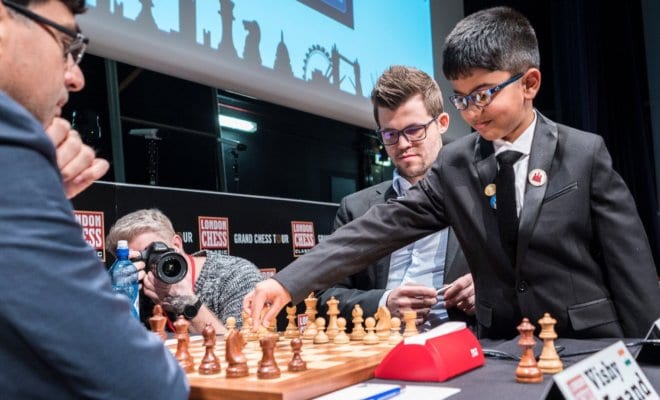Immigration
He’s 9, a Chess Prodigy and Must Leave the U.K., Officials Say

In a photo provided by his family, Shreyas Royal, 8, plays the ceremonial first move for Magnus Carlsen, center, against Vishy Anand at a chess tournament in London in 2017. (Family of Shreyas Royal via The New York Times)
There was no route, within the rules, that will allow Mr. Singh and his family to remain in the country.
He’s been called Britain’s “greatest chess prospect in a generation.” But when his father’s work visa runs out next month, 9-year-old Shreyas Royal must return to India, chess prodigy or not, according to Britain’s Home Office.
The case of Shreyas, who was born in India, grew up in south London and is among the top players in the world in his age group, turns on Britain’s strict enforcement of its immigration laws, the nature of his father’s visa and even the question of whether chess is a sport.
“It is just bureaucracy gone mad,” said Dominic Lawson, president of the English Chess Federation, on Thursday.
The case has drawn the attention of at least two members of Parliament, who say that Britain could lose one of its most promising young chess players if authorities fail to make an exception to allow his family to remain in the country.
“We have not really produced strong chess players since I was young,” Lawson said by telephone Thursday. “I mean, our top player is in his 40s.”
He signed a letter in June that called Shreyas “England’s best junior chess prospect in a generation” and implored Sajid Javid, the British home secretary, to step in.
Last week, Rachel Reeves and Matthew Pennycook, both lawmakers for Labour, the main opposition party, wrote a letter also calling on Javid to intervene. Reeves said on Twitter that Britain “shouldn’t be deporting its brightest young talent.”
Javid, she said in the letter, should “allow Shreyas to stay in the only home he can remember.”
A spokesman for the Home Office was adamant Thursday that there was no recourse for the family: “There is no route within the immigration rules which would allow the family to remain in the U.K.”
Shreyas was 3 when his father, Jitendra Singh, found work as an IT project manager in Britain for Tata Consultancy Services, on a one-year visa. Singh moved with his wife and son from Bangalore, India, in 2012, settling in South London.
There, Shreyas learned to play chess, developing exceptional skills and dreaming of becoming the world’s youngest chess champion. In 2016, he won a silver medal at the European Schools Chess Championships in Halkidiki, Greece, according to the English Chess Federation.
On the BBC Radio’s “Today” show Tuesday, Shreyas chalked up his success to “working hard — I think that’s the only reason.”
Singh later extended his stay with a five-year visa that was given to people who earn less than 120,000 pounds, about $155,000, a year. The visa expires in September.
Caroline Nokes, the minister of state for immigration, said in a letter sent in response to Lawson that while Shreyas shows “immense promise,” there was “no route, within the rules, that will allow Mr. Singh and his family to remain in the country.”
Singh said in a telephone interview that once this visa expires, he cannot apply for another year, and if he gets a new assignment in Britain, he would have to apply from India. So the family must leave the country.
Immigration law in Britain allows for visas to be issued to those with “exceptional talent” — in fields such as science, engineering, digital technology and fashion — or categories of “sport,” like archery, cricket, snooker or yoga.
But according to Lawson, chess does not qualify as an exceptional talent or a sport.
Reeves and others have suggested that if Singh earned more than 120,000 pounds, he would be eligible to extend his work visa. But the Home Office said that was not an option.
Singh’s visa, intended for transfers within a company, was “not a route to settlement” in the country, “and it is not an option to immediately extend it once the five-year period of leave comes to an end — regardless of how much the individual is earning.”
Famous sporting figures have been allowed to settle in Britain in the past, including Mo Farah, the Olympic distance runner, who was born in Somalia and became a naturalized British citizen.
And as Britain moves closer to leaving the European Union, the government has spoken in favor of attracting talent from around the world, amid fears that tighter borders could isolate the country.
For now, Shreyas — who is ranked fourth in the world for his age group, according to the English federation — is competing in the British Chess Championships. “We are getting a lot of support,” Singh said Thursday, “but we’re not getting any response from Sajid Javid.”
The prodigy and his family are worried, his father says.
“He’s asking a lot of questions about why we have to go back to India,” Singh said. “This is the only place he remembers.”
© New York Times 2018

You must be logged in to post a comment Login